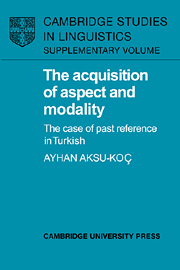Book contents
- Frontmatter
- Contents
- List of figures
- List of tables
- Acknowledgements
- Symbols and abbreviations
- PART I TENSE, ASPECT AND MODALITY IN ACQUISITION
- 1 Introduction
- 2 Tense, aspect and modality
- 3 Theoretical and empirical research on the development of temporal reference
- PART II DEVELOPMENT OF PAST REFERENCE IN TURKISH: FROM ‘PERFECT’ ASPECT TO ‘EVIDENTIAL’ MODALITY
- PART III CONCLUSIONS AND GENERAL IMPLICATIONS
- Appendix A
- Notes
- Bibliography
- Subject index
- Name index
3 - Theoretical and empirical research on the development of temporal reference
Published online by Cambridge University Press: 23 September 2009
- Frontmatter
- Contents
- List of figures
- List of tables
- Acknowledgements
- Symbols and abbreviations
- PART I TENSE, ASPECT AND MODALITY IN ACQUISITION
- 1 Introduction
- 2 Tense, aspect and modality
- 3 Theoretical and empirical research on the development of temporal reference
- PART II DEVELOPMENT OF PAST REFERENCE IN TURKISH: FROM ‘PERFECT’ ASPECT TO ‘EVIDENTIAL’ MODALITY
- PART III CONCLUSIONS AND GENERAL IMPLICATIONS
- Appendix A
- Notes
- Bibliography
- Subject index
- Name index
Summary
Questions about the acquisition of linguistic knowledge and skills (both in relation to the formal structure of language, i.e. syntax, and in relation to its content, i.e. semantics) cannot of course be posed without taking into account the developing cognition of the child.
However, as pointed out earlier, aspects of the language system differ in the extent to which they are referential, on the one hand, or concern language-internal relations, on the other, and hence in the extent to which they depend on cognitive prerequisites. Although the child's full discovery of the system of temporal reference of his language presupposes correlated developments in his conceptual understanding of time relations, it may in fact not be a necessary prerequisite, particularly in the early periods of acquisition. Furthermore, it should be clear from the theoretical treatments of the system of temporal reference that a cognitive understanding of time is not sufficient either, for its objectification in language. For, the way language allows for the objectification of what is subjectively experienced is such that it again brings to the fore the subjectivity of the speaker.
In other words, language simultaneously accomplishes the tasks of objectification of what is known, felt or intended and the expression of subjective relations to that which is thus objectified. Needless to say, the differences between languages in the means they provide for the accomplishment of this dual function lies in their different semantic organizations.
- Type
- Chapter
- Information
- The Acquisition of Aspect and ModalityThe Case of Past Reference in Turkish, pp. 27 - 48Publisher: Cambridge University PressPrint publication year: 1988

